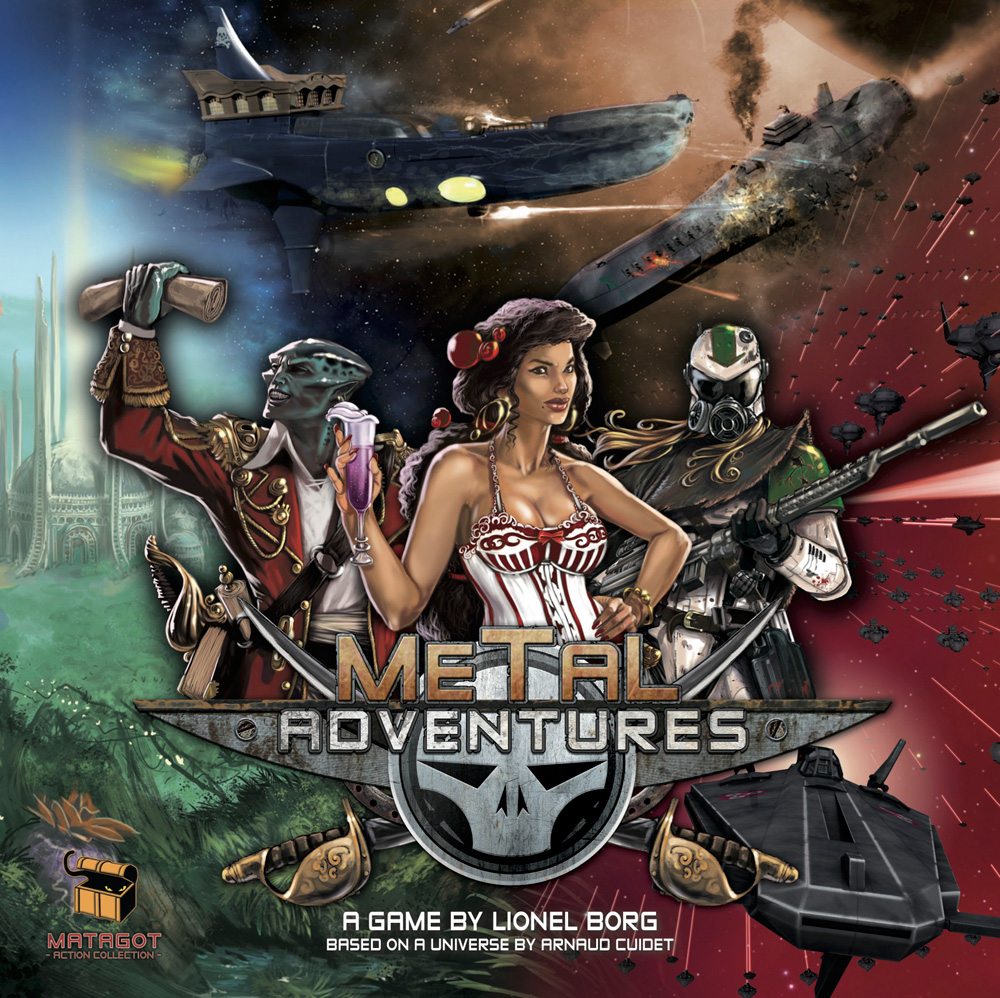I’ve got two words for you: Space Pirates! Yep, in Metal Adventures there are warring empires and a big trade conglomerate, but you get to be a space pirate, taking matters into your own hands. Pay attention, though: your friend and ally in this fight just might stab you in the back next time!
At a glance: Metal Adventures is for 3 to 6 players, ages 14 and up, and takes about an hour to play. It retails for $49.99, was designed by Lionel Borg, and is published by Matagot (or Asmodee in the US). The game has a medium complexity and involves both direct and indirect conflict, so it’s best played with gamers who won’t take it personally when you betray them. The age recommendation is probably about right, though younger kids who are more experienced would probably be able to handle it.
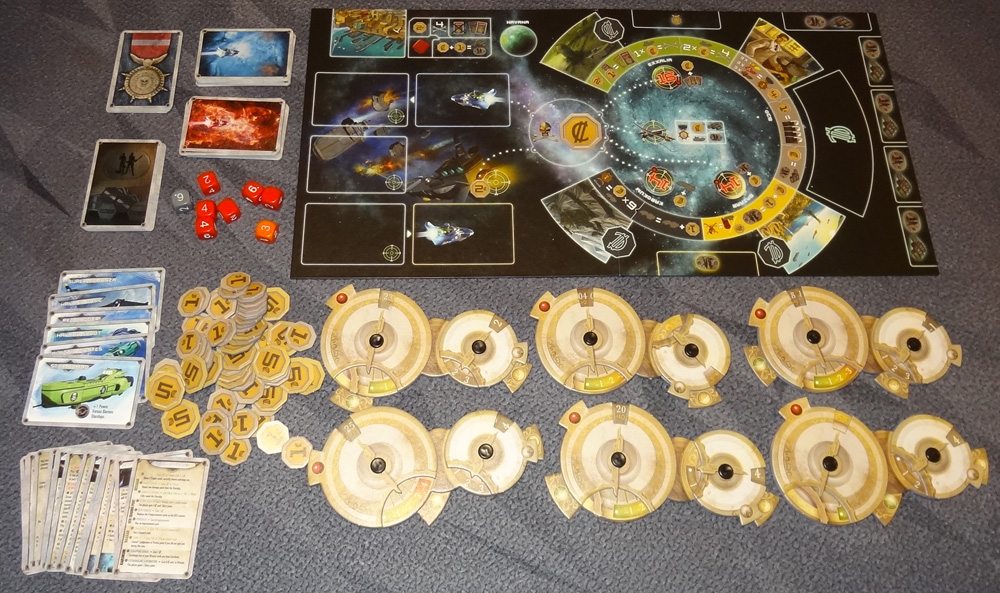
Components
The game includes:
- Game board
- 6 astrolabes
- 6 Base Starship cards
- 34 Near Space cards (30 spaceships, 4 events)
- 34 Deep Space cards (28 spaceships, 6 events)
- 18 Trophy cards
- 24 Improvement cards (15 equipment, 9 support)
- 72 Galactic Credits tokens (in denominations of 1 and 5)
- 2 Battle dice (1 orange, 1 grey)
- 6 Metal Faktor dice (red)
- 16 player aid cards
The game board is a narrow bi-fold rectangle with various locations marked for cards and tokens. Some of the cards are placed along the edges of the board. The center of the board has a track showing various actions that can be taken at the different locations–the actions are represented with icons, which means it’s language independent but you’ll be referring to the rulebook the first few times you play. We found that it got really messy trying to keep all the money in the bank area of the board, and instead just set most of it off to the side.
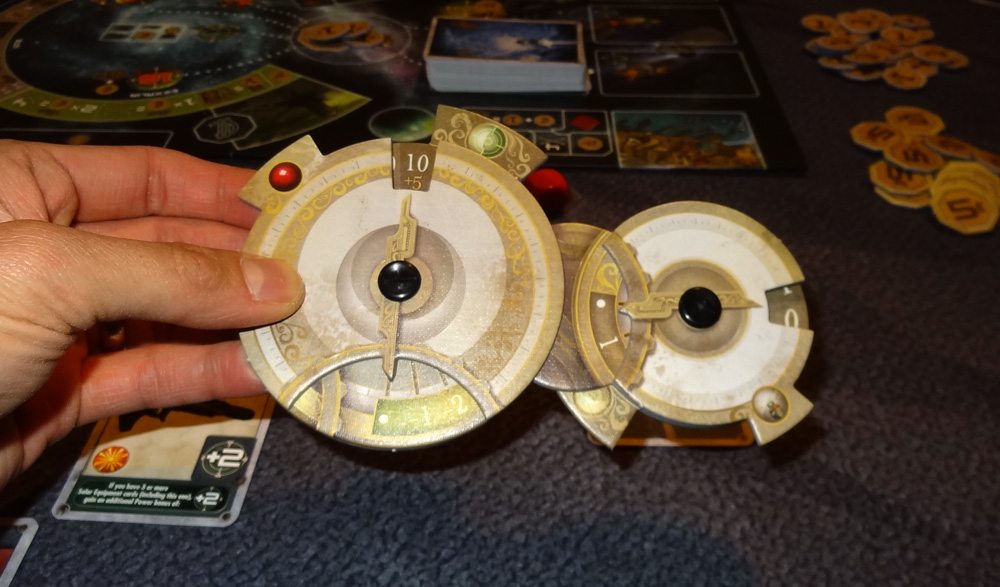
The astrolabes are fancy cardboard constructions (which you’ll need to punch out and assemble yourself). There are two dials, each with two wheels. On the left, the green tab is for your Power shown at the top of the wheel (the smaller number is the Power you contribute as an ally in a fight), and the red tab marks your Damage shown at the bottom of the wheel. When your Damage increases, your Power decreases automatically. On the right, the gold tab controls your Glory (victory points) and the silver tab controls the Judgement of Pirates (which decreases your Glory). It takes a little getting used to, but is fun to play with.
The cards are okay quality. The illustrations are good, though the women tend to be very busty–I guess space pirate fashion is pretty similar to Earth pirate fashion, at least the sort of thing you’d see in a movie. My main complaint about the cards is that the text is pretty small. There are a whole bunch of player aid cards–each player gets a couple of them, explaining turn order, battles, and so on. It might have been nice to have those on larger cards.
The dice are standard-sized six-sided dice with rounded corners. The two Battle dice have 1 through 6 as usual, but the Metal Faktor dice have the faces: blank-2-2-4-4-6.
How to Play
You can download a PDF of the rules here.
The goal of the game is to have the most Glory at the end of the game.

To set up the game, put the board in the center of the table. Shuffle the two Space Decks separately, and then place the Near Space deck (blue) on top of the Deep Space deck (red) and place those on the Space draw area. The Trophies are shuffled and placed next to the board where indicated. The Improvement cards are shuffled and placed in a deck near the OCG Trading post, and then the top four are turned face-up along the end of the board.
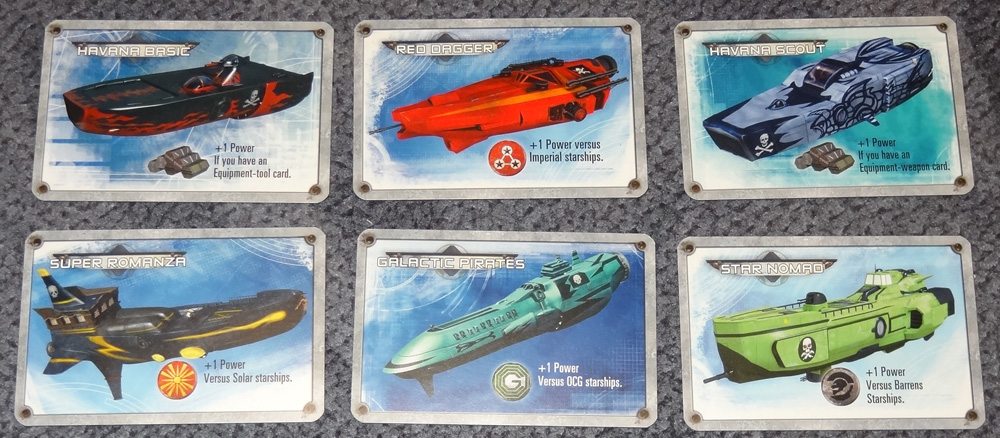
Each player receives:
- 1 Astrolabe
- 1 Player’s Base Starship card
- 1 Metal Faktor die–place it showing its blank face
- 3 Trophy cards–select 2 to keep, and place the third under the bottom of the deck
- 3 Galactic Credits
The Astrolabe should be set to 8 Power, 0 Damage, 0 Glory, 0 Judgement. Players take turns in clockwise order.
On your turn, you may either rest or take actions.
If you rest, you get 2 Credits, your ship is fully repaired, and you reset your Metal Faktor die to the blank face. You may optionally discard a Trophy and choose one of the top 2 Trophies from the deck. You may also buy 1 Improvement card for 1 Credit more than its printed cost.
If you take actions, first you must pay tribute to the Brotherhood of Pirates, placing 1 Credit in the Pirate’s Pot (marked with a skull and crossbones near the center of the board). Then, you must battle and you may take the Tour of Pirates, in any order.
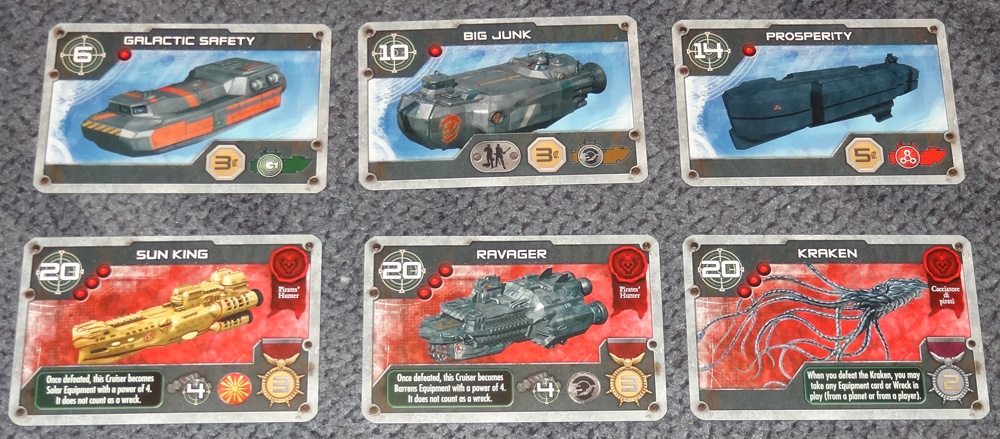
To battle, you attack a ship in space or from the discard pile by Karokum, or a planet, or another player.
For a ship in space, you draw the top three cards of the space deck and place them in the three empty spaces. If you draw an Event card, it is resolved immediately and replaced–though only one Event is resolved per turn and the others are discarded. Choose a ship to attack. The others are discarded to Karokum, except for Pirate Hunter Starships, which are shuffled back into the Space deck. Or, if you want to attack a ship via Karokum, pay 2 Credits to Karokum’s treasury, and then choose a ship from the discard pile to fight. If you’re attacking a planet, choose the planet.
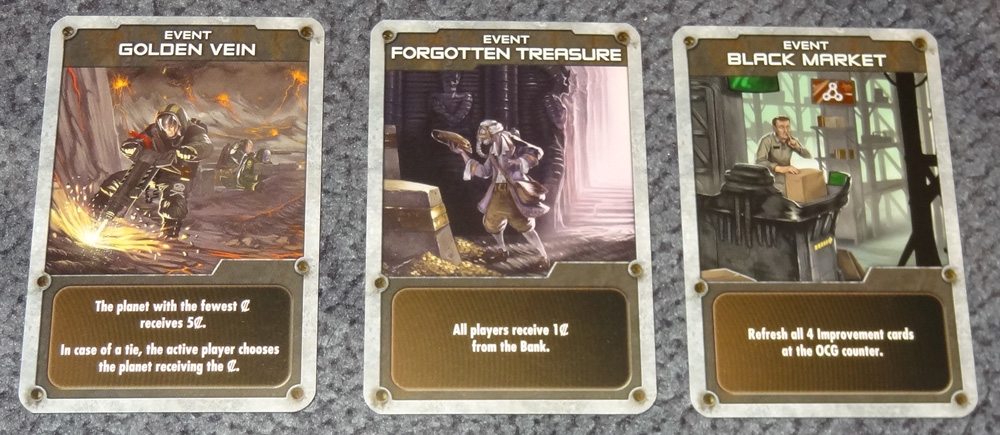
You may now ask for an ally–only one player may be an ally, and you negotiate for rewards. Then, you roll the two Battle dice–the orange die is for you (the attacker), and the grey die is for the defender. You and your ally may also roll their Metal Faktor dice if you choose, adding its value. Add up your Power, the ally’s support power (the smaller number below the power on the astrolabe), the orange die, and any Metal Faktor dice rolled. Also, you and your ally may play Support cards. Then, add up the defender’s power (shown on the ship card or the planet space), plus the grey die. If your ally betrayed you, then you add the traitor’s support power and Metal Faktor die to the defender. Higher score wins, attacker wins ties.
The Metal Faktor die is a way to potentially strengthen your attack. When rolled, it adds its face value to your attack. However, you must then keep that face showing–in your next attack, you must subtract that number from your power and then reset the die to its blank face. You may only roll your Metal Faktor die when it’s showing its blank face.
For ships, you earn all the rewards printed on the card if you win–it may be money, Improvement cards, and so on. You also keep the ship card itself face-down as a Wreck. You also decide whether to pay your ally the agreed-upon price. If you lose, you suffer damage equal to the number of red dots shown next to the power (up to 3).
If you win against a planet, you get various rewards–first, you get all of the money in that planet’s treasury. Attacking Exxalia lets you gain a Trophy card. Draw three Trophies, choose one, and put the other two at the bottom of the deck. Note you may only have two Trophies total, so if you have two already you must discard one before taking more. Attacking Bazaar lets you take one Support card from the discard pile. Attacking Karokum lets you take one Wreck from the Starship discard pile. If you lose against a planet, you and your ally each take 1 point of damage. Note: you may not attack a planet and use any of its actions on the same turn.
During a battle against a ship or planet, your ally may decide to betray you. It has to be declared after the alliance is agreed upon, but before the dice are rolled. The traitor’s Support power now goes to the target instead of you. Betrayals are not allowed in battles against Pirate Hunter Spaceships. The traitor must take one Judgement of Pirates point (which reduces Glory), and the traitor may not use Support cards. If you are betrayed and still win, the traitor takes 1 damage and you do not have to honor any rewards promised. If the target wins with a traitor’s help, the traitor only wins the money and no other reward, and you (the attacker) take 1 damage.
Finally, you may attack another player. In this case, both players may try to get allies, and this time you may have any number of allies. Allies add their Support power, and all players involved may roll their Metal Faktor dice and play Support cards if desired. Whoever has the highest score wins, with ties going to the attacker. The winner gets 1 Glory point and all the credits from the Pirate’s Pot. Also, the winner gets to take something from the loser: half the money, one Improvement card, or half the Wrecks. The losing player and allies each take 1 damage.

Taking the Tour of Pirates is optional–you start at Exxalia and make your way around, taking any of the actions you wish (but only in the printed order). I won’t get into all of the details, but here’s the list of actions:
Exxalia: Buy a new Trophy card, or repair your ships using cash and Wrecks.
OCG Counter: Trade Wrecks for Glory, refresh the four Improvement cards, or buy an Improvement card.
Bazaar: Buy a Support card from the discard, or trade cash or Pirate Hunter Wrecks to cancel Judgement of Pirates.
Karokum: Swap a Wreck for a ship in the discard, or trade cash or Wrecks for Glory.
Some of these actions will cost you money on top of the price of whatever it is you’re buying.
Improvement cards come in two types: Support cards (people) are one-time-use cards, discarded to Bazaar after they’ve been used. Equipment cards are placed face-up and may increase your Power or give you other abilities. If you lose Equipment, you lose the associated Power.

The Trophy cards award Glory and sometimes money when fulfilled–you reveal them at any time when you meet the requirements, but only one per player turn. Fulfilled Trophy cards are just added back to the bottom of the deck, so it’s possible for the same Trophy to be fulfilled multiple times in one game.
A note about negotiations: in this game, you’re free to negotiate about anything except Glory, which cannot be traded. And, of course, you can lie. Some exchanges are immediate and must be honored. However, if you make future promises, those can be broken. Any time you break a promise, you take a Judgement of Pirates point. You also take a Judgement of Pirates if you can’t pay the Brotherhood at the beginning of your turn and you don’t rest. Once you hit 4 Judgement points, you may not be an ally or get allies until you’ve removed some Judgement points.
The game ends at the end of player’s turn when either somebody has 9 Glory or more, or when there are 2 or fewer cards in the Space deck. The highest Glory wins; ties go to the player with the most money.
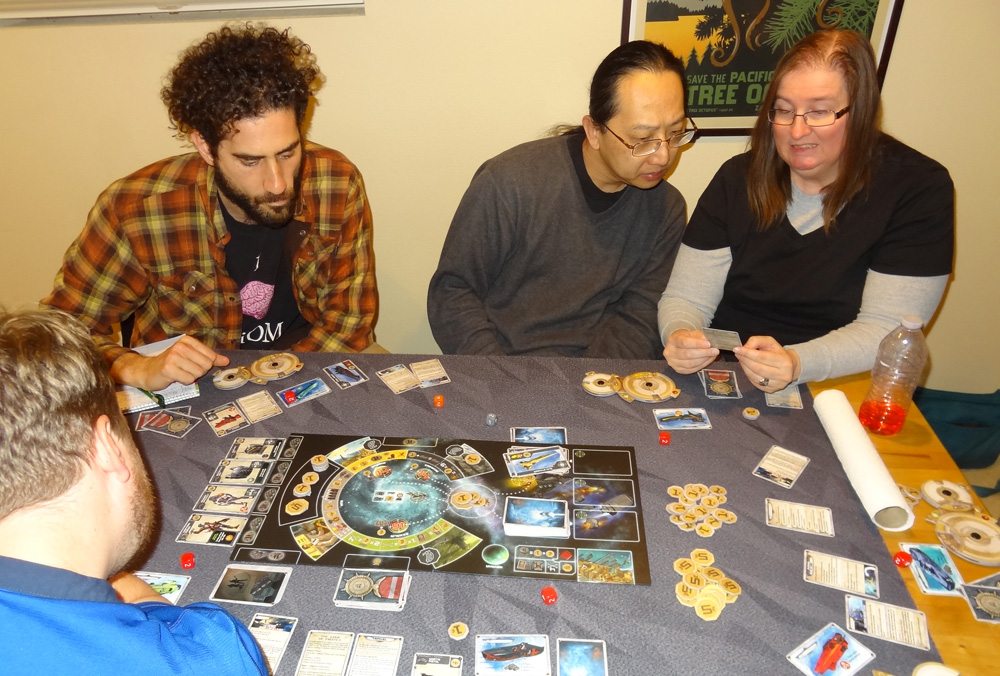
The Verdict
If the idea of being a space pirate appeals to you, you should check out Metal Adventures. You get to shoot down spaceships, trade in the Wrecks for cash or Glory, and then spend your money on cool equipment or hire powerful people to aid you. Heck, you can even attack entire planets and hold them for ransom.
Of course, there’s no honor among thieves. You might make all these plans with that old buddy of yours, only to find out that he’s sold you out to the Empire when your back was turned, leaving you solo … so to speak.
The game has some humor in it–they definitely take the “space pirates” theme to heart. There are people in spacesuits swinging sabers, and the spaceships look something like flying boats. I could probably do without so many busty women, though. (Seriously, there’s one on almost every face of the box.)
I like that there are rules for negotiating–and breaking promises. The Judgement of Pirates is a great mechanic, because it means you can turn on somebody but it will cost you a little bit at first. Turn on people too much, and not only will they not trust you, but you won’t even be allowed to ally with anyone, which is pretty crippling. But a well-timed betrayal can be pretty rewarding.
The Metal Faktor die is also a really great mechanic. You’re taking a gamble, because you could roll a 2, 4, 6, or nothing–but if you get a high boost this time, it means you’re taking a big penalty in your next attack. It’s a nice way to play with risk and reward.
The main downside is the Tour of Pirates. You do need to have access to all of those different actions, but that part of the game is where a player can get bogged down and take a long time. There are 10 actions in total, and you’re allowed to take all of them. It’s unlikely, since that would cost more money than most player will usually have, but it means that all options are open. And thematically, it’s also very weird that pirates can only visit these locations in a certain order. Come on: we’re pirates! We do what we please! Anyway, if there were a way to speed up the Tour of Pirates a bit, that would cut down on game length significantly. Maybe a sand timer.
This is also the sort of game where it can be hard to catch up when you fall behind. Let’s say somebody manages to attack you and take a valuable piece of equipment–not only did you take damage (reducing your power), but losing the equipment also reduces your power. You really need to win some fights–but nobody wants to ally with you because you’re not pulling your weight in a fight. Certainly there can also be some amount of kingmaking, picking on the leader and supporting the underdog, but that only goes so far.
Overall, I would say that while Metal Adventures isn’t my favorite game, it has a lot of fun features and definitely encourages a good deal of player interactions during the battles. If you’re looking for something with a bit of backstabbing, it’s worth trying.
Disclosure: I received a review copy of this game.

